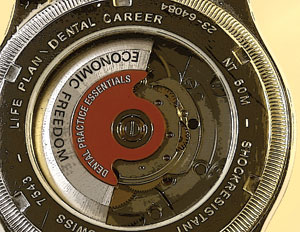Last month in Part 1, the author re-viewed the life cycle of a typical dentist and explained why life planning is more important than ever for today’s practitioners. Part 2, which follows, discusses the nuts and bolts of a comprehensive life plan, and how asking yourself the right questions can lead to a discovery process that will bring you peace of mind for the short term and the long term.
ASKING THE RIGHT QUESTIONS
“The quality of one’s life is in direct proportion to the quality of the questions one asks,” a philosopher once said. I would argue that the quality of one’s life plan follows the same rule. We begin the life planning process by asking our clients the magic-wand question: “If you had a magic wand and could have life any way you wanted, how would it be?” This is such an important question, but it is amazing how difficult it is for people to answer. We are conditioned to create limits for ourselves around what we believe is possible (or impossible), so we have trouble imagining life in an ideal way, even with the proverbial magic wand in our hands!
 |
|
Digital Illustration by Nathan Zak
|
From this broad question we start to get more specific. What would the ideal practice be like? Most of us don’t have a choice about whether we work. As discussed in Part 1, we’ll likely be working longer than our parents did. However, we do have a choice about where and how we work. What would your facility look like if you could have it any way you wanted? What technology would you incorporate? What kind of cases would be your focus? How many days would you work each week and how many weeks each year? Naturally, we must consider the same thing with your lifestyle outside the practice—your home, your car, your vacations, your commitments and activities outside the office.
Once this ideal life is clearly envisioned, we help our doctors look at how it can be achieved. Then we begin to piece together the economic puzzle, beginning with the most important pieces and working backward until we have a clear understanding of the ideal income needed to support your ideal lifestyle.
Economic Freedom. At some point, you will want the choice either to continue or to stop working altogether. When will that be? What will your life-style be like? How much will you need to have saved to sustain that lifestyle for the rest of your life? You must also think about your current lifestyle and the economics needed to give you a sense of stability and choices today. We look at all these questions and come up with an economic game plan for how much you need to be earning and saving annually and the best investment strategy for your goals.
The Essentials. Next we look at your spending needs on an annual basis for the non-negotiables. This covers the basics like your home, cars, children’s education, food, utilities, etc; but it also includes things like charitable giving, vacations, entertainment, and recreation—things that you want to ensure are funded up front, and not subject to whatever is left at the end of the year. We come up with a detailed spending plan based on your current needs and in anticipation of any major changes in the coming years.
The “Adds-Meaning” List. On top of the essentials are things that add meaning to your life above and be-yond the everyday. This is where the magic-wand question comes into play again. What have you always wanted to do, but stopped yourself because of time or economics? With proper planning, we can also build in things like a dream car, a second home, or world travel.
The Practice. Since the practice is the economic engine that fuels your life plan, we also take a comprehensive look at its unique economics. We look at the essentials (production, collections, overhead expenses, etc) as well as the “adds-meaning” list for the practice—technology or facility upgrades that would make your lifestyle within the practice ideal.
With these areas understood, we are able to zero in on the income needed to support your ideal lifestyle now while protecting your future at the same time. I know it sounds simple—and naturally, to be completely comprehensive we also look at pension, estate, tax, and other factors—but just this basic exercise creates more clarity than most people have ever had about their economic situation.
In most cases, we discover a gap between the current income and the amount needed to afford this ideal life—and that’s okay! The beauty of an integrated life plan is that it takes into account the practice and your ability to generate income. When the gap is understood, it is surprisingly easy to find areas of opportunity in the practice that can very quickly generate the needed income to close the gap. When you consider that in the average practice just a $100 improvement in hourly production can yield an additional $131,200 in net income annually, it becomes clear that you really are in control of the income that fuels your total life plan.
THE 365-DAY MINDSET: CALENDAR PLANNING
So let’s review. We know that we are going to live and work longer, and we want choices about how we go through life. We’ve waved the “magic wand” and asked the right questions. We are clear about our ideal lifestyle inside and outside the practice. We have understood the economics of that ideal lifestyle and created a plan to meet our income needs. What’s left? Time, of course! Fully understanding calendar planning would require an additional article, so I will just touch on the most important aspects here.
I have always believed we think about time incorrectly. We get attached to labels: weekdays, weekends, work time, personal time, overtime, time off, etc. We try to sequester our activities into these labeled categories, and then we feel resentful or guilty when one area leaks over into another. Instead, I challenge you to think about time this way: there are 365 days in a year with 24 hours in each day. No matter what we do, we cannot somehow get more or less time than the hours given to us, nor can we get more or less than anyone else. In this way, time is the great equalizer.
Given that we have 24 hours in a day and 365 days in a year, I believe that we need a spending plan for those days and hours just like we need a spending plan around our economics. It is not about 9 to 5 or Monday through Friday; it’s about ensuring that we set aside time for our non-negotiables and the things that add meaning to our lives, just like we do with our money. If we do not schedule the most important things, time gets spent here and there. Before we know it, we have spent it all.
We teach clients to think of time in 4 major areas: vision time, on time, in time, and personal time. Vision time is the time you spend creating your life plan, including your practice vision and mission. It is the time that you use just to dream by yourself or with your spouse about the future. On time is time you spend working on your business, taking clinical or leadership education, spending time align-ing your team, reviewing practice data, and creating growth strategies. In time is your revenue-generating practice time. Personal time is the time you spend at home, and with family and friends.
When creating your calendar plan for the year, I would recommend that you take the following approach:
Block out your personal time. This includes vacations, weekends you want to protect, special family events, and things that you know about well in advance like golf tournaments and school plays.
Block out vision time. Usually I recommend a block of several days, either at the beginning or end of the year. In addition, block out another day devoted to vision time about every 4 months. When tied into a weekend, these vision-time days need not take significant production time away from the office.
Block out “on” time. How you structure your on time is up to you, but I recommend at the very minimum a day a month away from your day-to-day practice responsibilities. Some practitioners also like to block out an hour each evening, or a half day per week for on time.
Be clear about your “in” time. Know that as an entrepreneur you will naturally do what it takes to meet your in time objectives, but as long as your other non-negotiables are already scheduled, you will not have to make tough sacrifices.
If this sounds like a lot of time, it is! But it is time you are spending anyway, organized in a way that allows you to protect the activities that mean the most to you. I have always said that if I am going to be doing nothing, I want to feel great about doing nothing, and I want to do it at the highest level. Thinking about your time in these areas and planning your calendar this way allows you to increase the value of your time in each area so that it is truly optimized.
WHEN CHOICES REALLY MATTER
All of this might sound like a lot of planning. If you are one of the many dentists who has settled into a comfortable routine, it may even sound like more trouble than it’s worth to put your life plan in place. That’s because when life is good and things are going our way, it is easy to be seduced by the path of least resistance. However, it is when things go wrong that having a plan in place is most important. In 2003, my wife of 25 years was diagnosed with a cancer that required us to seek treatment at the Mayo Clinic in Arizona; we were living in Vancouver, Canada, at the time. I took weeks away from the office and also found myself with unplanned medical expenses. Because we had been disciplined about our economics and were clear about our life plan, we were able to make those decisions without a second thought. Because our calendar was structured to protect precious time together and with our children, I was able to enjoy the additional flexibility I needed to spend time with my wife in her final months. In addition, because my business partnership was also aligned around a vision and a comprehensive plan, I had the support of my partners in the weeks leading up to and following her passing.
Life planning is not about sticking to a rigid set of principles or following a series of steps toward a goal. It’s not about budgeting or investing. It’s not about trying to predict the future or prepare for every possible scenario. Life planning is about knowing what is important to you, putting pieces in place to have and enjoy those things, and living each day on purpose with peace of mind.
I encourage you to take time away from your everyday commitments to look at your life comprehensively and ask yourself the really important questions. I can promise you that life will not always go according to your plan, but that having a plan will allow you to experience the best life has to offer, with choices and freedom at every step of the way.
Mr. Manji is founder and CEO of the Scottsdale Center for Dentistry, the continuation of his longtime goal to provide a world-class facility where dentists and teams can receive comprehensive, evidence-based, patient-centered learning. For more than 20 years, he has been educating and motivating dentists across North America. Mr. Manji’s newest workshops, “Dental Office Design,” “BreakThrough Practice,” and “CEREC Experience,” and his classics, “Leadership and Team Alignment” and “Transitions and the Business of Dentistry,” combine his endless energy and inimitable style with his practical teachings to make these programs a “must-see.” He can be reached at imtiaz.manji@scottsdalecenter.com or at (866) 781-0072.











